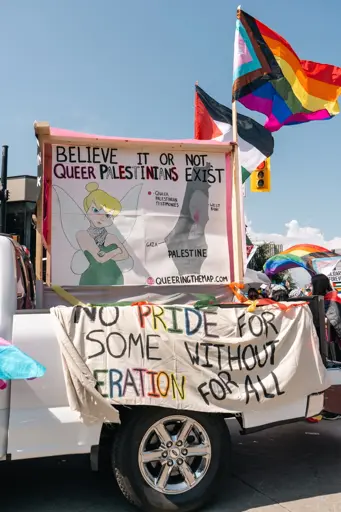On a late August day last year, under a hot clear sun, Ottawa’s queer and trans communities took to the streets with their kaleidoscope of flags and flooded the downtown core with rainbows.
But this year, at every step among them – up and down the march, and all along the rows of spectators – were Palestine flags and the iconic stripe-and-fishnet stitching of the keffiyeh.
To anyone who knows our communities, this isn’t surprising. For the vast majority of us, first-hand experiences of discrimination lead naturally to progressive values of social justice, anti-oppression, resistance, and solidarity. Since October 2023, many community members have marched and organized under Palestinian flags against Israel’s brutal genocidal assault on Gaza – sometimes as human beings of conscience, sometimes explicitly from a queer political identity responding to the calls to action of queer Palestinian organizations. The queer left tradition of Palestine solidarity has deep roots in the organizing of queer Palestinians and their allies, alongside a well-articulated set of critiques of Israel and of settler-colonial and imperialist power that long predate the current moment.
But in Ottawa, queer solidarity with Palestine wasn’t a counterforce on the outside of a business-as-usual Pride Week. Instead, many of the usual corporations and politicians stayed home while grand marshal Haley Robinson sported a keffiyeh, Queers for Palestine made up one of the largest contingents in the march, and solidarity politics permeated what Capital Pride volunteer Jamie* described to me as “a harmonious marching for queer and trans solidarity and celebration, as well as holding space for Palestine.”
This mass display of Palestine solidarity was anything but a thin gloss over an otherwise status-quo Pride. Rather, it was a genuine popular display of queer liberation – a remarkably successful experience in mainstreaming the international solidarity traditions of the queer left and queer of colour organizing. This unequivocal success of a truly political Pride suggests that now is the time for the queer left traditions of solidarity and coalition-building across communities under attack to move from an oppositional current in our spaces to being a long-term strategy for our communities in the face of existential right-wing threats to come.
No pride for only some. Pride was and continues to be a riot. Down with all opressors no matter who they are targetting.



